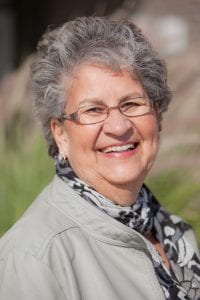Grad profile: Winnie Giesbrecht (Licensed Practical Nursing, 1972)
 Having grown up in northern Manitoba, Winnie Giesbrecht knows first-hand just how hard it can be for people living in remote communities to access quality health care.
Having grown up in northern Manitoba, Winnie Giesbrecht knows first-hand just how hard it can be for people living in remote communities to access quality health care.
A 1972 graduate of Red River College’s Licensed Practical Nursing program, Giesbrecht has made it her life’s mission to serve those in need of medical care — overcoming many professional and personal challenges along the way.
Originally from Grand Rapids, Giesbrecht moved to southern Manitoba as a teenager to go to high school, but moved back to her hometown soon after when she got married and settled down to raise a family.
Tragically, Giesbrecht’s husband died, leaving her as the sole provider for her three young children. She relocated to Selkirk to be closer to family, and eventually completed high school while working to support her family. Upon earning her high school diploma, she enrolled in the LPN program at RRC.
“While I was taking my GED in Selkirk, we went on a tour of Red River College and at the time, they had just started the LPN program, and it drew an interest for me. I had always had a desire to work with people and in the medical field before,” said Giesbrecht. “I knew I had to do something to create a better life for my sons and provide for them the best I could, and the only way to do that was to get an education.”
Giesbrecht went to school during the day and worked at a local restaurant in the evenings and weekends to support her family, and graduated from the LPN program in 1972. She was quickly hired on at Selkirk General Hospital, but continued her studies while working at the hospital to earn a Registered Nursing Diploma, and her hard work and sacrifice hasn’t gone unnoticed by her children
“It wasn’t easy for mom to work to pay the bills, study, and look after us,” said Giesbrecht’s son, Reg Fredborg. “But she persevered and made it.”
After spending some time working with the Winnipeg Aboriginal Council Interpreter Program and as a staffing officer for nurses for Northern Nursing Stations, Giesbrecht became aware of how difficult it was for patients from northern communities to effectively communicate with medical staff.
Fluent in Cree, Giesbrecht was hired by St. Boniface Hospital in 1985 for their Interpreter Program, and assisted the medical team with the Dialyses Program for Renal Failure Patients from northern communities. Initial results for the program were disappointing, but Giesbrecht pursued patients beyond the hospital setting to determine the problem by developing a relationship with patients where they felt comfortable expressing their fears, anxieties, and needs.
Giesbrecht discovered that once patients left the hospital setting, they weren’t able to obtain the appropriate accommodation and support to make the necessary dietary and lifestyle changes to manage their health problems.
“The doctors and nurses always complained that the patients weren’t being compliant with their treatment, but when I went to visit them where they were staying when they came to Winnipeg for treatment, they weren’t being treated well. They were living in slum housing,” said Giesbrecht. “For the well-being of patients, language is the key. They started to develop fear, and a lack of trust because they weren’t able to communicate with anyone. If you don’t understand them, how are you going to treat them?”
To address these challenges, Giesbrecht prepared a business plan for a medical boarding home for dialysis patients to receive proper care and coaching on how to control their condition.
While she did receive some funding, Giesbrecht and her new husband Henry used their life savings to purchase a building on Mayfair Avenue for the project, which they named Nakiska Place. Because some dialysis patients require long-term care, Giesbrecht saw the need for family housing and secured a location on Watson Street near Seven Oaks Hospital, which through government funding was developed into Dial-A-Life Housing.
After more than 20 years in the medical field, Giesbrecht and her husband sold Nakiska Housing in 1997 and retired. The couple purchased a condo in Puerto Vallarta, Mexico, and while on vacation, Giesbrecht found a large population of people living in a local garbage dump and felt she needed to do something to help them.
 “I saw all these children who were living in the garbage dump with their families and eating out of the garbage dump, and it touches your heart strings when you see something like that,” said Giesbrecht.
“I saw all these children who were living in the garbage dump with their families and eating out of the garbage dump, and it touches your heart strings when you see something like that,” said Giesbrecht.
In order to communicate with locals, Giesbrecht learned Spanish and began volunteering with a group who were working to aid the people living in the garbage dump. The women there shared with Giesbrecht their dreams of an education for their children and emancipation from the garbage dump, and Giesbrecht was eventually invited to join the volunteer group’s board.
Since then, she has been working tirelessly to help relocate residents into more appropriate housing outside the dump, and has helped transform the garbage collection into a profitable recycling enterprise that is self-supporting for the people who live there.
She has also dedicated a significant portion of her time to raising money for an affordable housing project in the area, and her fundraising efforts have also helped to pay for education. Giesbrecht often uses her own resources to pay for local children to attend school, and is currently assisting four local students with their university tuition.
For her years of hard work and dedication to helping others, Giesbrecht has received numerous awards, including the Commemorative Medal for the 125th Anniversary of the Confederation of Canada for Volunteer Work (1992), and the B.C. National Aboriginal Achievement Award (1995), and was most recently honoured by the state of Jalisco in Mexico for her work with local families.
She has also served on the Canadian Panel on Violence Against Women, the Canadian Council for Aboriginal Business, the Native Women’s Association of Canada, the Winnipeg Hospital Authority Board, the St. Boniface General Hospital Research Board, and the Urban Aboriginal Strategy Committee Advisory Council.
Profile by Hayley Brigg (second year, Creative Communications)
